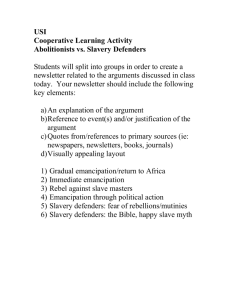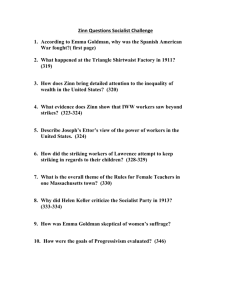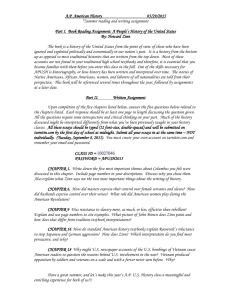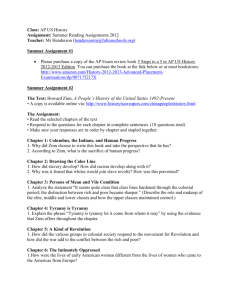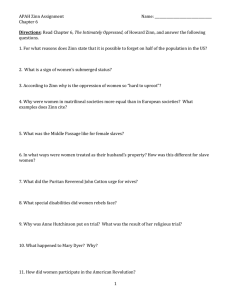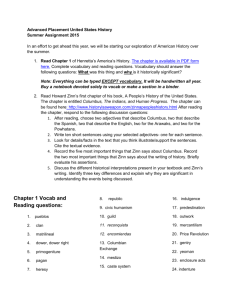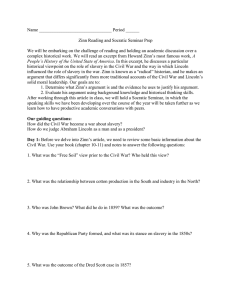APAH Zinn Assignment Name: Chapter 9 Directions: Access the free
advertisement
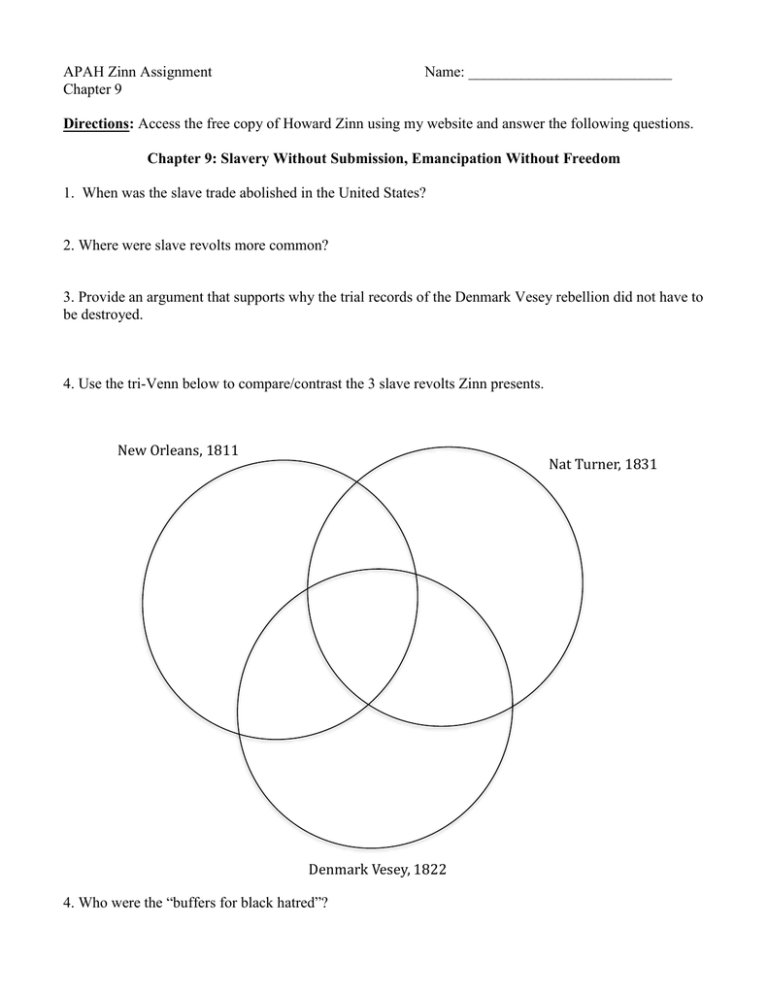
APAH Zinn Assignment Chapter 9 Name: ___________________________ Directions: Access the free copy of Howard Zinn using my website and answer the following questions. Chapter 9: Slavery Without Submission, Emancipation Without Freedom 1. When was the slave trade abolished in the United States? 2. Where were slave revolts more common? 3. Provide an argument that supports why the trial records of the Denmark Vesey rebellion did not have to be destroyed. 4. Use the tri-Venn below to compare/contrast the 3 slave revolts Zinn presents. New Orleans, 1811 Nat Turner, 1831 Denmark Vesey, 1822 4. Who were the “buffers for black hatred”? 5. Because slave families were often broken up, how were children raised? Use the T-chart below to contrast the White middle-class nuclear family to that of a slave family. Slave Family White, Middle-class Nuclear Family 6. What did David Walker in Walker’s Appeal urge? 7. Why was the Fugitive Slave Act of 1850 passed? 8. How did JW Loguen respond when his former owner asked Loguen for compensation for his freedom? 9. Who did Frederick Douglass accuse of complicity of allowing slavery to exist? 10. What to the American Slave is your Fourth of July? 11. Explain the tactical differences between black and white abolitionists. What extra burden did black abolitionists carry? 12. What triple hurdle did Black female abolitionists face? 13. What 3 things did the national government enforce, collaborate and declare by 1858 that Zinn states would never allow the national government to let slavery end by rebellion? 14. Zinn states, “Such a national government would never accept an end to slavery by rebellion. It would end slavery only under conditions controlled by whites, and only when required by the political and economic needs of the business elite of the North.” Do you agree with Zinn’s assessment of how slavery would have to end? Explain your answer. 15. Summarize Lincoln’s views on slavery in the following years: 1844 – 1858 – 1858 in Charleston – March 1861 – 16. Why do you supposed Lincoln’s views changed so much from 1844 to 1861? Discuss not only his personal views but the issues surrounding the nation as well (laws, events, etc.) 17. Complete the table below. According to Zinn the Civil War was not a clash: Why? Over the issue of slavery as a moral institution. Northern Elites Wanted: Between the people of the nation but of the elites. Southern Elites Wanted: 18. In 1861, Congress declared its reason for fighting the Civil War. What was it? 19. What does Lincoln state is his paramount object in the struggle of the Civil War? Do you think that truly represented Lincoln’s views? Explain. 20. Zinn quotes The London Spectator responding to the Emancipation Proclamation. "The principle is not that a human being cannot justly own another, but that he cannot own him unless he is loyal to the United States." Is this a fair assessment of the Emancipation Proclamation? Why, or why not? 20. Why do you suppose the Emancipation Proclamation was purposely limited? After the Proclamation was issued what happened to the Union Army? How did the purpose for fighting the war change? 21. What Amendment did the Emancipation Proclamation help to create? 22. According to du Bois, why did Lee have to surrender? (How could slaves have destroyed the Confederacy on their own?) 23. What three black women played a major role in the Civil War? 24. Provide two examples of evidence that highlighted the limited nature of the Emancipation Proclamation. 25. African-Americans generally agreed that the acquisition of ___________ would secure their freedom after the Civil War was over. However, most freed slaves were able to acquire ___________ land. 26. What was Special Field Order No. 15? Who gave the order? Who rescinded the order? 27. What did the following Amendments accomplish? 13th – 14th – 15th – 28. What was the purpose of the Civil Rights Act of 1875? 29. How did Andrew Johnson halt the progress made by President Lincoln in affording freed blacks equal standing in southern society? 30. After 1869, how many African Americans were voted into political office? (The Senate and the House of Representatives) 31. How could a freedman’s vote be bought? 32. Who organized the Ku Klux Klan? 33. Who was Charles Caldwell? What did his death symbolize? 34. Why did the Supreme Court strike down the Civil Rights Act of 1875? 35. Describe the composition of the White court during the Reconstruction Era (Civil Rights Act 1975) Explain how Harlan was a vocal minority of the Court. What did he use to justify his dissent? Why was his position unique? 36. How did the viewpoints of this bench restrict the rights of freedmen of the South? 37. What did Plessy v. Ferguson declare? 38. Explain the spillover of the election of 1876 into 1877. How did Hayes win the election? (What concessions were made to FL, LA, and SC?) What was the fate of African-Americans as a result? 39. What did Booker T. Washington urge fellow blacks to do that Zinn believes was “a low point for black people in America.” 40. What two African-American men oppose Booker T. Washington’s beliefs and how did they oppose him? 41. At the end of the chapter, Zinn poses this question: “Was Du Bois right-that in that growth of American capitalism, before and after the Civil War, whites as well as blacks were in some sense becoming slaves?” Was du Bois right? Explain your answer.
